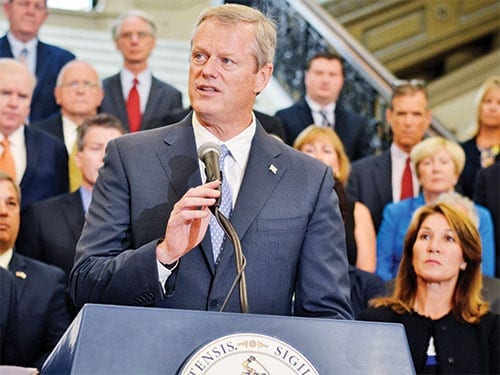Baker proposes new drug-related mandatory minimum
Clashes with many legislators’ push to repeal such sentencing

Gov. Charlie Baker proposed legislation last week that would increase the number of drug-related offenses that carry mandatory minimum sentences in the Commonwealth. His proposal comes at a time when many activists and members of the state legislature have been pushing for widespread repeal of mandatory minimum sentencing, especially for drug offenses.
Baker’s proposal would apply to dealing of illegal drugs in instances where the drug use results in fatality. The person who provided the drug would be required to receive at least five years in prison and could be handed a life sentence.
“When illegal drug distribution causes a death, laws that were designed to punish the act are inadequate to recognize the seriousness of the resulting harm,” Baker stated in a letter to lawmakers.
Meanwhile, the state’s judiciary committee is studying a bill submitted earlier this year by Rep. Evandro Carvalho and others that would repeal mandatory minimum sentences for drug offenses as well as an omnibus reform bill submitted by Sen. Sonia Chang-Diaz and Rep. Mary Keefe that includes such a reform.
During a phone interview with the Banner, Chang-Diaz praised Baker’s serious attention to the opiate crisis, but said his latest proposal on mandatory minimums is contrary to current understanding of the relative utility of such policy.
“Mandatory minimums are not at all valuable as a tool in the toolbox for combating opiate addiction and the drug trade. They’ve been a demonstrably proven failure from an efficiency standpoint and are very costly to the community and taxpayer,” Chang-Diaz said. “[The governor’s] mandatory minimum proposal is going in the opposite direction of the larger criminal justice reform understanding that is sweeping the nation and that we’re working on here in Massachusetts.”
Chang-Diaz said she could not speculate on Baker’s thought process, but that in general, when faced with crises, there is a temptation to believe the solution lies in writing a new law.
“I think when you see a problem in the world like an opiate crisis, there’s is an understandable desire and intent to do something — to throw what we got at it and see what works. Passing another law that you can charge people with feels like we’re doing something,” she said. “But we have to look at unintended consequences of putting a law on the books that I don’t think is going to solve the problem. When you look at the root causes of opiate addiction in our state, the drivers — Do we have enough beds for people suffering from addiction? — rather than throwing them in jail, which does nothing to solve it, and then putting them back on the street.”
Political impact
Baker’s latest proposal does not derail the mandatory minimum repeal bills currently being considered, Chang-Diaz said. Those bills seek to reform existing laws, while Baker’s measure has yet to receive implementation and so would not impact their scope.
What Baker’s proposal does signal, however, is that legislators have their work cut out for them to reach understanding with the governor on the issue. A complication, Chang-Diaz said, is that it had appeared that Baker already was at that point of understanding three years ago, when he was on the campaign trail.
A 2014 Families Against Mandatory Minimums survey filled out by Baker shows that he marked “yes” to the question “Do you support the repeal of mandatory minimum sentences for drug offenses under Massachusetts law?” He also indicated on the survey that he opposed enacting additional minimum sentencing laws for drug offenses.

![Banner [Virtual] Art Gallery](https://baystatebanner.com/wp-content/uploads/2024/04/NJ-H_1-150x150.jpg)




